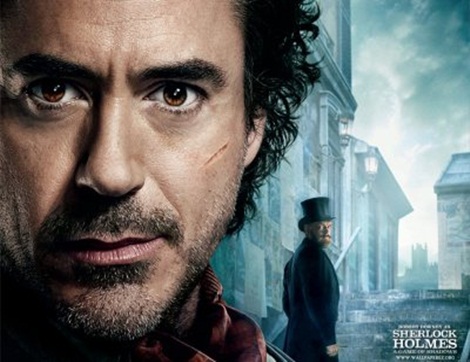
Sherlock Holmes movie shows reality of power politics
By Mark Anderson
The latest Sherlock Holmes movie, A Game of Shadows, brings the viewer on a daring expedition against the tactics and mechanics of conspiratorial design. The new Holmes and Watson transcend unmasking and politely apprehending the evil-doers—romping into a realm of head-on confrontation. This satisfies greatly our unmet need to finally make justice happen decisively and conclusively, in a real world where evil too easily triumphs.

While some have criticized the plentiful action scenes for adding too much brawn to the universally known brainy characters—Holmes, played masterfully by Robert Downey Jr., and trusted associate Dr. John Watson, equally well done by Jude Law—the fight scenes contribute the needed action to attract younger viewers, while complimenting Holmes’s long-honored art of deduction to adroitly solve complex crimes.
As Holmes explains in Shadows, evildoers win mainly “because they can,” due to the general absence of an equally potent countervailing force. Holmes and Watson provide this counterforce with a finesse and brass-knuckled courage that seems missing in the real world. Yet, perhaps this will inspire some viewers to acknowledge and help rout the real villains of the world, whomever and wherever they may be.
This is the second Sherlock Holmes movie featuring these two lead actors. The debut, Sherlock Holmes, has Holmes taking on Lord Blackwood, a sinister figure who controls but sets out to destroy the British parliament in a false-flag operation that is run through a Masonic cabal. The scheme is made to appear supernatural when Blackwood fakes his own death and “returns” from the dead to launch world domination. The Masonic group which Blackwood runs, and its collusion with government, closely mirrors reality.


The message: The world is not as it seems and people with an unquenchable thirst for power do exist.
Our villain in the latest picture is Holmes’s traditional arch-enemy, Dr. James Moriarty, pitted against Holmes by the pen of Sir Arthur Conan Doyle, the famed creator of Sherlock Holmes. Moriarty, played by Jared Harris is an esteemed academic whose peculiarities are discerned by Holmes in ways that teach the value of observing small details.
Moriarty reads books on horticulture but lets his office plants die; and Holmes has the professor autograph his own book about asteroids, which enables Holmes to examine the signature, with Holmes describing the cursive as that of someone with a “genius-level intellect.” But the signature’s slant and pressure signal “acute narcissism,” and “moral insanity,” as Holmes accurately informs his annoyed nemesis.
The year is 1891. Moriarty had already launched a series of false-flag bombings, with more to come, in an effort to spark a war between Germany and France. Anarchists are hired to do the dirty work, to provide cover for the “respected” professor. Again, this is true to life at a time when real elites will instigate false-flag violence to keep their plans intact.
Moriarty ruthlessly acquires a munitions factory and makes a massive arsenal of bombs, cannon and sophisticated rifles that the belligerents in planned wars can buy from him. Holmes and Watson, with plenty of humor, resourcefulness and fortitude, cleverly locate the professor’s huge warehouse in which the massive arsenal and complete maps of a world-wide war plan are hidden. Germany and France are just for starters, it turns out.
In the real world, a tragic war against Iran seems one false-flag operation away. Life easily imitates art.
Holmes, in confronting Moriarty, declares, “Now that you have the supply [of weapons], you intend to create the demand. . . ” This outlines the basic reality: A world stocked with the tools of war, in which vast fortunes are made from war, can easily be pushed over the brink.
A key German official is shot by Moriarty’s top sniper during a peace summit at a posh hotel. Several German and French officials at the summit are promptly killed in a bomb attack to cover up the assassination. Holmes makes a mistake and is too late to foil the bombing. War then seems certain.
What follows in Switzerland are amazing events, revelations and the ultimate confrontation between Holmes and Moriarty at a meeting that resembles the real-life Bilderberg Meetings. Intentionally or not, this movie asks the average person to consider the fact, not the theory, of criminal rule behind the throne—what some dare call conspiracy. And seeing the good guys win against such odds is good medicine.
